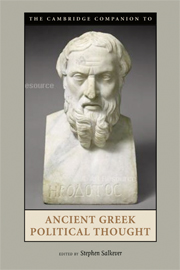Book contents
- Frontmatter
- Introduction
- 1 Homer and Political Thought
- 2 Foundings vs. Constitutions: Ancient Tragedy and the Origins of Political Community
- 3 Most Favored Status in Herodotus and Thucydides: Recasting the Athenian Tyrannicides through Solon and Pericles
- 4 Thucydides and Political Thought
- 5 “This Way of Life, This Contest”: Rethinking Socratic Citizenship
- 6 The Political Drama of Plato’s Republic
- 7 Practical Plato
- 8 Reading Aristotle’s Nicomachean Ethics and Politics as a Single Course of Lectures: Rhetoric, Politics, and Philosophy
- 9 Lived Excellence in Aristotle’s Constitution of Athens: Why the Encomium of Theramenes Matters
- 10 The Virtue Politics of Democratic Athens
- 11 Origins of Rights in Ancient Political Thought
- 12 The Emergence of Natural Law and the Cosmopolis
- Select Bibliography
- Index
Introduction
Published online by Cambridge University Press: 28 September 2009
- Frontmatter
- Introduction
- 1 Homer and Political Thought
- 2 Foundings vs. Constitutions: Ancient Tragedy and the Origins of Political Community
- 3 Most Favored Status in Herodotus and Thucydides: Recasting the Athenian Tyrannicides through Solon and Pericles
- 4 Thucydides and Political Thought
- 5 “This Way of Life, This Contest”: Rethinking Socratic Citizenship
- 6 The Political Drama of Plato’s Republic
- 7 Practical Plato
- 8 Reading Aristotle’s Nicomachean Ethics and Politics as a Single Course of Lectures: Rhetoric, Politics, and Philosophy
- 9 Lived Excellence in Aristotle’s Constitution of Athens: Why the Encomium of Theramenes Matters
- 10 The Virtue Politics of Democratic Athens
- 11 Origins of Rights in Ancient Political Thought
- 12 The Emergence of Natural Law and the Cosmopolis
- Select Bibliography
- Index
Summary
This volume is a companion to Greek “political thought,” rather than “political philosophy” or “political theory” - why? One reason will be apparent from the table of contents: the chapters have a broader scope than the terms “philosophy” and “theory” would suggest, and their authors have been trained and teach in a variety of fields, including philosophy, classical literature and history, and political theory. But there is a more substantial reason behind the choice of title. There are three propositions that unite these chapters and that define a central tendency in recent interpretive work on Greek political thought:
Our consideration of fundamental questions about politics in the world of ancient Greece must be pursued in texts that cross the standard modern genre distinctions among philosophy, history, and literature. Taking these modern academic distinctions too seriously as a guide to inquiry is an anachronistic mistake and can result in serious distortions of the Greek texts. Treating Plato as a post-Kantian systematic and doctrinal philosopher is one important example of such a distortion; treating Thucydides as a proto-“scientific” historian is another.
But the purpose of studying these Greek texts and practices is not archival or antiquarian, nor is it a romantic longing to escape from modernity to a lost idyllic world; instead, the ultimate goal inspiring these studies is to bring voices embodied in these ancient texts into our contemporary discussions of political thought and action.
At the same time, this attempt to bring ancient Greek voices into modern discussions will itself be anachronistic unless we are very careful to place the Greek texts in the context of debate and action in which they were written.
- Type
- Chapter
- Information
- Publisher: Cambridge University PressPrint publication year: 2009
- 1
- Cited by

